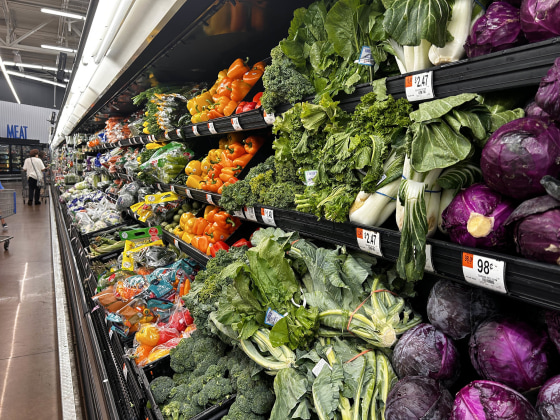A listeria recall has been issued for over a dozen types of vegetables sold at Walmart and Aldi stores in several states. The recall was initiated by Ohio-based Wiers Farm Inc. and expanded by the U.S. Food and Drug Administration (FDA) after reports of contamination by the Michigan Department of Agriculture.The recalled vegetables include:
- Bagged poblano, cubanelle, and serrano peppers
- Bagged green beans
- Bagged salad cucumbers
- Organic bell peppers, cucumbers, yellow squash, and zucchini
- Whole cucumbers and green beans sold individually or by weight
- Cilantro, parsley, and various other peppers sold in bunches
These products were packaged between July 5-12, 2024
. The recalled vegetables were sold at Walmart stores in 15 states (CT, DE, IL, IN, KY, MD, MI, NJ, NY, OH, PA, VA, and WV) and Aldi stores in 5 states (KY, NY, OH, PA and WV).As of July 26, 2024, the FDA reported no illnesses or consumer complaints related to the recalled products. Listeria monocytogenes can cause serious and sometimes fatal infections, especially in young children, frail or elderly people, and others with weakened immune systems. Symptoms include fever, muscle aches, and gastrointestinal issues.Consumers who purchased the recalled vegetables should discard them immediately or return them to the store for a refund. For questions, contact Wiers Farm Inc. directly.
Listeria Monocytogenes: The Dangerous Bacteria Behind the Recall

Listeria monocytogenes is a serious foodborne pathogen that can cause a rare but deadly infection called listeriosis. This bacteria is particularly dangerous for pregnant women, newborns, older adults, and people with weakened immune systems.Listeriosis symptoms can include fever, muscle aches, headache, stiff neck, confusion, loss of balance, and convulsions. In pregnant women, listeriosis can cause miscarriage, stillbirth, premature delivery, or life-threatening infection in newborns.The CDC estimates that listeriosis causes about 1,600 illnesses and 260 deaths in the United States every year. It’s crucial for consumers to take this recall seriously and discard any potentially contaminated vegetables immediately.
Affected Products: Identifying the Recalled Vegetables

The recalled vegetables were packaged between July 5-12, 2024 and sold at Walmart stores in 15 states and Aldi stores in 5 states. The affected products include:
- Bagged poblano, cubanelle, and serrano peppers
- Bagged green beans
- Bagged salad cucumbers
- Organic bell peppers, cucumbers, yellow squash, and zucchini
- Whole cucumbers and green beans sold individually or by weight
- Cilantro, parsley, and various other peppers sold in bunches
Consumers should check their refrigerators and pantries for these items and discard them immediately if purchased from the affected stores during the specified dates. It’s also important to clean and sanitize any surfaces that may have come into contact with the recalled vegetables.
Walmart and Aldi Respond to the Listeria Recall
:max_bytes(150000):strip_icc()/Vegetables-Sold-at-Aldi-and-Walmart-Recalled-Due-to-Listeria-Contamination-f2b2852c80b54356a62f950b13742545.jpg)
Both Walmart and Aldi have taken swift action in response to the listeria recall. Walmart listed the produce recall on its website with a link to the announcement from Wiers Farm and the FDA.Aldi issued its own recall notice for customers, alerting shoppers in Kentucky, New York, Ohio, Pennsylvania and West Virginia who may have purchased affected products. The company stated, “ALDI puts the safety and integrity of the products it sells first. If customers have products affected by this recall, they are advised to discard it immediately or return it to their local store for a full refund.”Both retailers are working closely with the FDA and Wiers Farm Inc. to ensure the safety of their customers and remove all potentially contaminated products from store shelves.
Preventing Listeriosis: Tips for Consumers

To prevent listeriosis, it’s crucial for consumers to take the following precautions:
- Check your refrigerator and pantry for the recalled vegetables and discard them immediately if purchased from the affected stores during the specified dates.
- Clean and sanitize any surfaces that may have come into contact with the recalled vegetables.
- Cook all vegetables thoroughly to kill any potential bacteria.
- Avoid cross-contamination by keeping raw vegetables separate from cooked or ready-to-eat foods.
- Wash your hands frequently when handling raw vegetables and before preparing food.
If you have consumed any of the recalled vegetables and are experiencing symptoms of listeriosis, such as fever, muscle aches, headache, stiff neck, confusion, loss of balance, or convulsions, seek medical attention immediately.
The Importance of Food Safety
This listeria recall serves as a stark reminder of the importance of food safety. Foodborne illnesses can have serious consequences, especially for vulnerable populations like pregnant women, young children, older adults, and those with weakened immune systems.As consumers, it’s our responsibility to stay informed about food recalls and take appropriate action to protect ourselves and our families. By working together with retailers, manufacturers, and regulatory agencies, we can help prevent the spread of foodborne illnesses and ensure a safer food supply for all.
Conclusion: Staying Vigilant in the Face of Food Recalls
The listeria recall affecting Walmart and Aldi vegetables is a sobering reminder of the potential dangers lurking in our food supply. While the FDA and affected retailers have taken swift action to address the issue, it’s crucial for consumers to remain vigilant and take the necessary precautions to protect themselves and their loved ones.By staying informed, checking for recalled products, and practicing good food safety habits, we can all play a role in preventing the spread of foodborne illnesses like listeriosis. Together, we can work towards a safer and healthier food system for all
